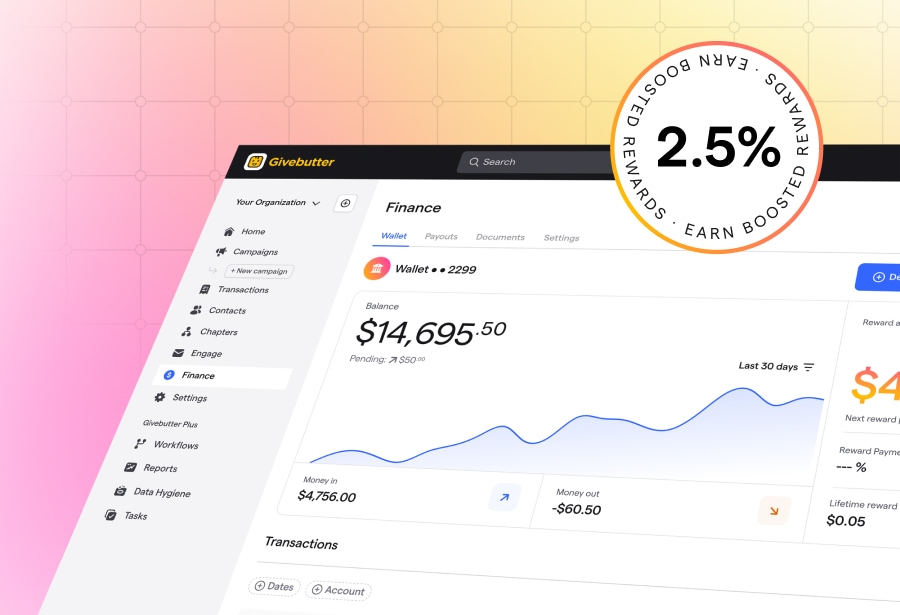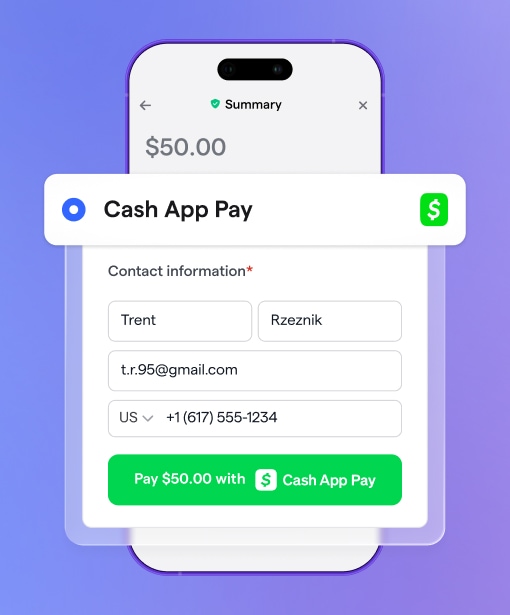Table of contents
Table of contents
Starting a nonprofit is exciting, but the paperwork, timelines, and IRS requirements can quickly feel overwhelming. If you’re eager to raise funds and make an impact now, waiting months (or longer) for 501(c)(3) status can feel like an unnecessary roadblock.
That’s where fiscal sponsorship comes in. It can open the door to tax-deductible donations sooner, help you build momentum, and allow you to focus on the work that matters most. Of course, it’s not a magic shortcut. Fiscal sponsorship comes with real trade-offs, responsibilities, and fees that are important to understand before moving forward.
In this guide, we’ll break down how fiscal sponsorship works, outline the different models you may encounter, weigh the pros and cons, and help you determine whether it’s the right path for your organization. We’ll also share practical tips for finding a sponsor that truly aligns with your mission, so you can fundraise confidently and keep your cause moving forward.
Key takeaways
- Shortcut your way to accepting donations 🏃 Fiscal sponsorship allows you to receive charitable contributions quickly, without going through the IRS tax-exemption process.
- Comprehensive or fundraising-specific 💰 Two sponsorship models give you the option of benefiting from full admin and operations support, or just a way to receive donations.
- Finding the right sponsor matters 🤝 Look for a partner with similar values, and make sure you’re happy with elements of the deal like amount of risk, control, and fees.
- Fiscal sponsorship fees apply 💲 Fiscal sponsorship organizations typically charge an administrative fee of 1–15%, depending on the agreement.
- Givebutter works for fiscally sponsored nonprofits 🧈 Sign up using your sponsor’s EIN and enjoy access to all our free fundraising tools, as well as features designed with sponsees in mind—like donation receipts that reflect the recipient organization correctly.
What is fiscal sponsorship?
Fiscal sponsorship is an arrangement in which a larger, more established nonprofit (the fiscal sponsor) assumes financial and legal responsibility for another, smaller organization. This arrangement allows the smaller organization to start project work and raise funds without completing the full process of forming an independent nonprofit and registering with the IRS
How does fiscal sponsorship work for nonprofits?
Fiscal sponsorship is often the fastest route for a nonprofit to begin fundraising and carrying out its mission. It serves as an alternative to filing independently with the IRS to obtain 501(c)(3) status, a process that can be time-consuming and complicated.
Securing a fiscal sponsor can give organizations access to:
- Tax exemption 💸 Charitable projects may be exempt from paying federal income tax, and in some cases, state income or sales tax.
- Tax-exempt financing 🏦 In certain situations, organizations can apply for tax-exempt bonds through their fiscal sponsor.
- Tax-deductible contributions 🎁 Donations made through a fiscal sponsor may be tax-deductible for supporters.
In most fiscal sponsorship arrangements, the sponsor serves as the administrative hub, receiving donations and grants and then allocating funds to the sponsored organization.
Pros & cons of fiscal sponsorship for nonprofits
Fiscal sponsorship can be an efficient way to launch a project and reduce some of the administrative burden of running a nonprofit. However, prospective sponsees should also consider potential drawbacks, including administrative fees, legal risk, and reduced control.
Benefits of fiscal sponsorship
- Expert bookkeeping and administrative support 📚 Sponsees can focus more on their mission, knowing the nonprofit sponsor handles bookkeeping, reporting, and tax compliance.
- Predictable administrative fees 🤓 Sponsoring organizations typically charge a fixed or clearly defined fee, which can help prevent unexpected operating costs.
- Built-in HR, benefits, and board oversight 💛 Fiscally sponsored organizations do not need their own board of directors or human resources team. In some cases, staff may also be eligible to enroll in the sponsoring organization's healthcare plan or other benefits.
- No long-term commitment 🙅 When ready, sponsees can terminate the fiscal sponsorship agreement and file for separate tax-exempt status.
Cons of fiscal sponsorship
- Administrative fees 💰 While the fees may be predictable, they can still be significant. Some nonprofits report figures as high as 15%. It may be worth comparing these costs with the expense of filing independently for 501(c)(3) nonprofit status.
- Limited access to funds 💸 Because donations go directly to the sponsor, it’s ultimately up to them when funds are released. If the sponsor faces financial difficulties, your project could be impacted.
- Less control and autonomy ⚙️ With the sponsoring organization handling administration, payroll, HR, and governance, some sponsees find the reduced independence frustrating.
- Shared relationship and reputation management 🤝 Your project’s reputation is closely tied to that of your sponsor, so any negative PR affecting them may affect you as well. Maintaining a strong, transparent working relationship is essential.
Fiscal sponsorship can be a helpful route for new nonprofits, small startup projects, student-led initiatives, and organizations seeking to avoid delays while still benefiting from nonprofit status. Still, it’s important to carefully weigh the pros and cons based on your specific situation and goals.
Types of fiscal sponsorship models
There are two main fiscal sponsorship models for nonprofit organizations: Model A and Model C. The model you choose depends on what you need from the arrangement and the type of project you want to fund.
Model A fiscal sponsorship
With a Model A fiscal sponsorship, the sponsoring organization takes responsibility for all operations and effectively runs the project as one of its own programs. For this reason, it’s often referred to as the comprehensive fiscal sponsorship model.
This arrangement is common among newer or smaller nonprofit organizations wanting assurance that the legal aspects of running a program are properly handled. Because the sponsor manages back-office operations, governance, and compliance, the sponsee can focus on developing its mission, planning initiatives, and fundraising.
⭐ Ideal for: New or smaller nonprofits that want to reduce operational complexity.
Model C fiscal sponsorship
A Model C fiscal sponsorship is less comprehensive than Model A and focuses primarily on access to charitable donations. It’s also sometimes called a pre-approved grant relationship.
Model C is best suited for organizations that don’t need full administrative or operational support. This type of relationship is generally easier and quicker to establish than Model A and allows the sponsee greater autonomy in how it runs its programs.
⭐ Ideal for: One-time or temporary charitable projects, or organizations that are in the process of seeking 501(c)(3) status but need a way to raise funds in the meantime.
How to get fiscal sponsorship for your project or cause
Securing a fiscal sponsor is a simple three-step process, but it does require time and effort to find the best-fit partner for your organization.
1. Find the right fiscal sponsor for your project 🔎
You’ll be working closely with your sponsor, so it’s essential that you find the right match. Look for a fiscal sponsor that aligns with your mission, provides the type of sponsorship you need, and offers terms you’re comfortable with.
Here’s how to find the right match:
- Look for similar nonprofits 🏢 Seek out organizations with goals or values similar to yours and ask whether they’d consider becoming your fiscal sponsor.
- Use online directories 💻 Directories like the Fiscal Sponsor Directory or the National Network of Fiscal Sponsors can help you identify potential sponsors.
- Ask for recommendations 🙋 Sometimes, word of mouth is the most effective approach. Reach out to your trusted network connections for sponsorship referrals.
2. Prepare & submit a fiscal sponsorship proposal ✍️
Once you’ve narrowed down your options, prepare a detailed proposal that clearly outlines your mission, project details, budget, fundraising strategy, and anticipated outcomes.
This proposal will serve as your formal introduction to potential sponsors, so tailor it to their requirements and priorities. Follow the sponsor's guidelines closely, provide all necessary documentation, and be prepared to answer questions about your project.
3. Review & finalize the fiscal sponsorship agreement 🤝
Once you’ve found a willing sponsor, work together to finalize the fiscal sponsorship contract. This step typically involves negotiating terms, clarifying expectations, and ensuring both parties understand their roles and responsibilities.
While every agreement is different and should be reviewed by a professional, most fiscal sponsorship contracts cover topics such as:
- Financial responsibilities
- Reporting requirements
- Decision-making processes
- The level of control the fiscal sponsor has over the project
- Communication expectations
- The project’s charitable purpose and activities
Before signing, keep in mind that you may need to negotiate terms such as administrative fees and services provided.
Fundraise as a fiscally sponsored nonprofit on Givebutter
Fiscal sponsorship can be a powerful way to start fundraising sooner, build credibility, and focus on your mission without waiting on a lengthy IRS process. When set up thoughtfully, it gives you the structure and support you need to grow while keeping your long-term goals in sight.
Givebutter is built to support fiscally sponsored nonprofits at every stage. Sponsees can sign up using their sponsor’s EIN and access the same free, flexible fundraising tools trusted by thousands of nonprofits, with no workarounds required. From branded campaign pages to donor management tools, Givebutter makes it easy to raise funds confidently while keeping everything accurate behind the scenes.
Donation receipts reflect the correct legal entity, contributions are properly processed as tax-deductible, and your supporters receive a smooth, trustworthy giving experience. Whether you’re just getting started or preparing to file for your own 501(c)(3) status, Givebutter helps you fundraise with clarity, momentum, and peace of mind.
.png)
Start fundraising as a fiscally sponsored organization today
Sign up for Givebutter today to start fundraising for your fiscally sponsored organization.
FAQs about nonprofit fiscal sponsorship
Who can be a fiscal sponsor?
A fiscal sponsor can be any established nonprofit organization with tax-exempt status under section 501(c)(3) of the IRS code in the United States.
What’s the difference between a fiscal sponsor vs. a fiscal agent?
There are two main types of fiscal entities that provide financial oversight for nonprofits: fiscal sponsors and fiscal agents. While they may appear similar, they differ significantly in legal and tax responsibilities.
- Fiscal sponsor: Allows an organization or project to operate under its tax-exempt status, often maintaining legal and financial control of the sponsored project.
- Fiscal agent: Manages certain financial or administrative operations for a project or organization but does not provide tax-exempt status or assume legal responsibility.
What is a fiscal sponsorship agreement?
A fiscal sponsorship agreement is a legal document that establishes the contractual relationship between the sponsor and the sponsee. It typically outlines roles and responsibilities, scope of services, legal compliance, and financial management.
How much does a fiscal sponsorship cost?
Fiscal sponsorship fees generally range from 1% to 15%, with many sponsors charging between 5% and 15%. Some sponsors may also offer additional services at an extra fee, such as grant writing or event management.
Who are the biggest fiscal sponsors?
Well-known fiscal sponsors include Fractured Atlas, the Hack Foundation, and Tides Foundation. Combined, they support thousands of nonprofit causes and charitable projects.
Is fiscal sponsorship worth it?
For many organizations, fiscal sponsorship can be a valuable option. It allows nonprofits to fundraise and receive charitable donations without completing the 501(c)(3) application process, provides administrative and compliance support, and can offer credibility when applying for grants.
.svg)






%20(1).png)



.svg)











_4x.webp)

(3)_requirements_4x.webp)

